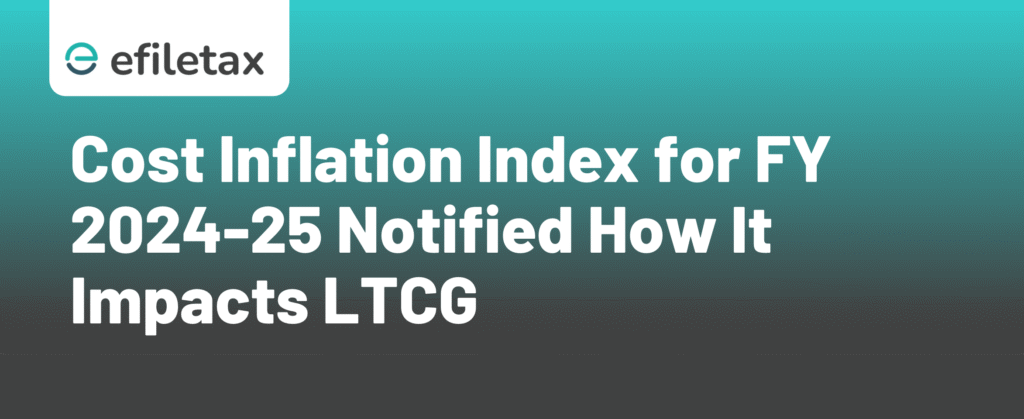
Cost Inflation Index FY 2024-25 What You Must Know
The cost inflation index (CII) for FY 2024-25 has been notified by CBDT as 363, up from 348 in the previous year. This simple but powerful number plays a crucial role in calculating long-term capital gains (LTCG) and reducing your tax liability on assets like property and gold.
If you’re planning to sell a long-term capital asset, understanding how CII works can save you a significant amount in taxes.
What is Cost Inflation Index?
Inflation eats into the real value of money. The Cost Inflation Index is a tool under Section 48 of the Income Tax Act, 1961, that adjusts the purchase price of an asset for inflation when computing long-term capital gains.
It applies to:
- Immovable property (land/buildings)
- Jewellery
- Unlisted shares
- Bonds (except certain categories)
- Other capital assets
It does not apply to:
- Equity shares or equity mutual funds (already taxed differently)
- Debt mutual funds (post-April 2023)
Latest CII: FY-wise Comparison
| Financial Year | Cost Inflation Index (CII) |
|---|---|
| 2024–25 | 363 |
| 2023–24 | 348 |
| 2022–23 | 331 |
| Base Year 2001–02 | 100 |
The base year was shifted from 1981 to 2001 to simplify reporting and align with modern asset valuations.
How to Use CII for Indexation
Let’s break it down with a step-by-step guide.
Identify your purchase year and cost
Say you bought a property in 2004 for ₹15,00,000.
Identify the year of sale and selling price
Sold it in FY 2024-25 for ₹50,00,000.
Apply the indexation formula
objectivecCopyEditIndexed Cost = (CII of year of sale ÷ CII of year of purchase) × Actual Purchase Cost
So,
javaCopyEditIndexed Cost = (363 ÷ 113) × 15,00,000 ≈ ₹48,23,008
Calculate LTCG
javaCopyEditLTCG = Sale Price – Indexed Cost
= ₹50,00,000 – ₹48,23,008
= ₹1,76,992
This indexation helps reduce your taxable gain from ₹35 lakh (unindexed) to just ₹1.77 lakh.
CII Notified on 23 July 2024
The CBDT issued Notification No. 58/2024 dated 23.07.2024, confirming that the Cost Inflation Index for FY 2024-25 is 363.
🔗 Source: CBDT Notification – incometaxindia.gov.in
No Indexation for Debt Mutual Funds from AY 2024–25
Important update: From 1 April 2023, indexation benefits on debt mutual funds have been withdrawn if they invest less than 35% in equity (as per Finance Act, 2023). They’re now taxed at slab rates, even if held for the long term.
But for:
- Land & buildings
- Gold
- Unlisted shares
— indexation via CII still applies.
Expert Tip: Don’t Miss CII in Tax Planning
Many taxpayers skip applying CII while calculating LTCG manually or while filing returns through basic software. Always ensure:
- CII is correctly applied for eligible assets
- Purchase year is accurate (if inherited, use previous owner’s acquisition year)
For inherited/gifted assets: Indexation is allowed from the original owner’s purchase year, not when you received it.
FAQs on Cost Inflation Index
Q1. Can I use indexation benefit for equity mutual funds?
No. Equity mutual funds have their own LTCG rules (10% after ₹1 lakh gain, no indexation).
Q2. Is indexation allowed for gifted property?
Yes. Use the original owner’s purchase year and amount for calculation.
Q3. Can I apply CII if the asset is sold before 2 years?
No. For most assets, indexation applies only to long-term capital assets (held over 2 years for property).
Conclusion
The Cost Inflation Index for FY 2024-25 (CII = 363) is an essential number for anyone selling long-term capital assets. It reduces your tax burden by adjusting for inflation.
Before you file your return or plan a sale, run the numbers using CII. Or better—let Efiletax do it for you, accurately and compliantly.
Need help with LTCG calculations?
File your return with confidence using Efiletax.in – India’s trusted tax experts for individuals and small businesses.